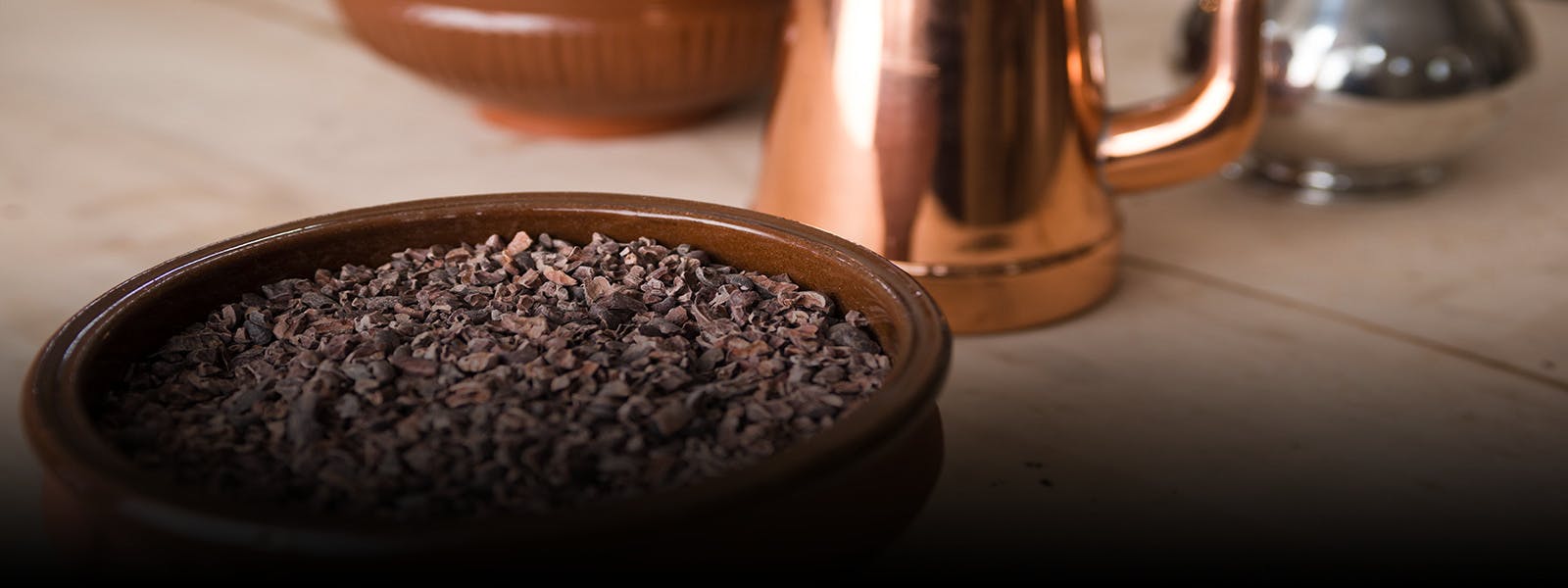
Chocolate, an expensive luxury drink, was made and prepared here
The Chocolate Kitchen at Hampton Court Palace was a small but specialised series of rooms used by royally-appointed chocolate makers to prepare this expensive delicacy for kings and queens.
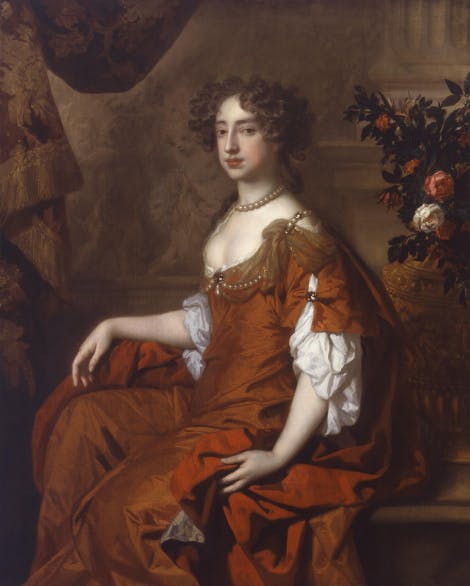
Image: Queen Mary II, by Sir Peter Lely, c1677. © National Portrait Gallery
Royal chocolate
The Chocolate Kitchens were built by Christopher Wren in about 1690 as part of William III's (1689-1702) and Queen Mary II's (1689-94) rebuilding of Hampton Court Palace. At the time, chocolate was relatively new in England and an expensive luxury. Its inclusion in the new part of the palace demonstrated the wealth, power and modernity of William's and Mary’s court.
The King and Queen would usually take their chocolate as a drink at breakfast time. It was often served in the bedroom and served as part of a ritual known as the levee, where the king or queen would get dressed ceremoniously in front of a special chosen few. William, however, was especially fond of chocolate and would drink it throughout the day, often accompanied by his close friend and courtier, the Duke of Portland.
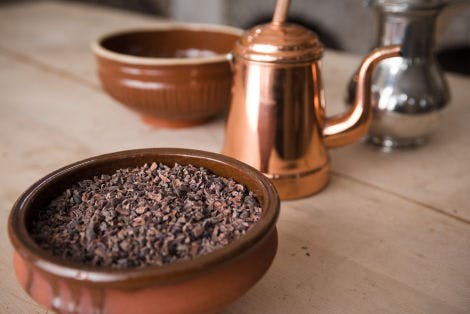
Image: Once roasted, the husks of the cocoa beans were removed and the nibs, seen here, were ground by hand into a smooth paste, a process that took hours. © Historic Royal Palaces/Yves Salmon
Who were the chocolate makers?
William III employed a chocolate maker called Solomon de le Faya. George I’s chocolate maker was Thomas Tosier, who started working for the King in 1714. He ran a chocolate house on Chocolate Row in Greenwich, south east London. His wife Grace managed and expanded the business while Thomas worked at court. It was very popular and often mentioned in the social pages of newspapers. Grace even installed a ‘Great Room’ in 1721, just for dancing!
The Tosier legacy
The Tosier name was clearly important, as even after Thomas died and Grace remarried she remained a Tosier. It appears that Grace was quite a flamboyant character, known for wearing a ‘large brimmed hat’ and ‘flowers in her bosom’.
Grace was so popular that the fashionable painter Bartholomew Dandridge painted her portrait in 1729. Today you can see this original print hanging above the fireplace in the Chocolate Room.
Did you know?
Grace Tosier's portrait became a collectable print and she was considered a Georgian celebrity.
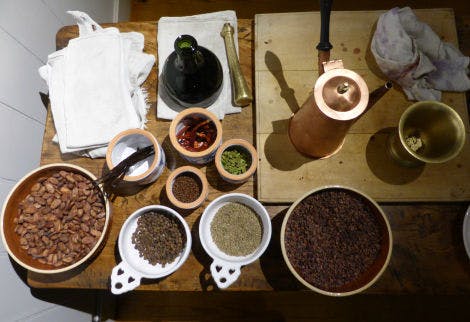
Image: Chocolate Kitchen demonstration set-up with chocolate pot and various ingredients including Cocoa Beans and Chillies © Historic Royal Palaces
Hot chocolate!
In the Chocolate Kitchen today, you can see all the equipment and examples of the ingredients and different flavourings used to make this delicious royal drink. These included red chillies, for those at court who liked the extra heat!
Chocolate fit for a king
Until the 1800s, chocolate was mainly served as a drink. At Hampton Court Palace, having a special kitchen ensured that it was made for the court from bean to cup.
The cacao nuts were roasted, flavoured, and the nibs were ground on a hot stone slab called a metate to form a paste. The paste was then formed into blocks known as cakes. These were then left to mature for several months.
The cakes were then melted into milk, water or wine, which was sweetened with sugar and flavoured with spices. All of this hot, messy process took place in the Chocolate Kitchen.
The drink was then taken into the Chocolate Room, a secure space, where the gilded chocolate pots and expensive porcelain cups were stored. It was then poured into the serving items and taken directly to the king or queen.

Image: The Chocolate Kitchen, showing a close view of chocolate rounds on paper and other ingredients on a wooden table surface © Historic Royal Palaces.
Chocolate 'cakes'
Transforming cocoa beans into readily usable chocolate was a fundamental activity of the Royal Chocolate Kitchen during the Georgian period. There the cocoa beans underwent a laborious process, which turned them into the chocolate cakes, 'cakes' in this case meaning 'pieces'. These delicious discs were stored for months on wax paper, as seen here.
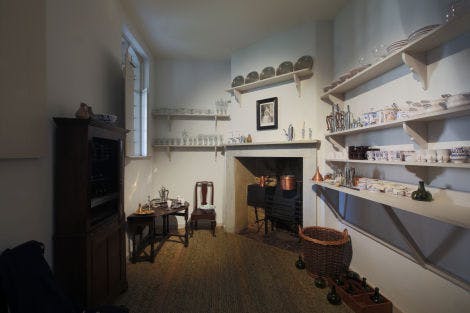
Image: The Chocolate Kitchen displays serving equipment that would have been used to present chocolate to the king. © Historic Royal Palaces
Hidden treat
Until very recently, the Chocolate Kitchen was used as a flower store, filled with shelves, pots and vases. However, previously it had been a working kitchen that served the grace and favour apartments above.
Thankfully, the 18th-century fixtures and fittings all survive – you can see a Georgian fireplace and smoke jack within the chimney, a pair of charcoal braziers, plus a folding table, cupboard and shelves.
The Chocolate Room
Just down the cloister from the Chocolate Kitchen, next to Chocolate Court, is the Chocolate Room. As with many parts of the palace, this too was recently a store that would have been used by residents of the neighbouring grace and favour apartments.
Our helpful 18th-century inventory is quiet on the use of this room, but we know from work records that the King’s Chocolate Room was next to Chocolate Court.
Today, you can see replicas of the porcelain, delftware cups and the silver chocolate pots, and serving equipment.
Did you know?
The Chocolate Room held the beautiful serving equipment used to present chocolate to the monarch.
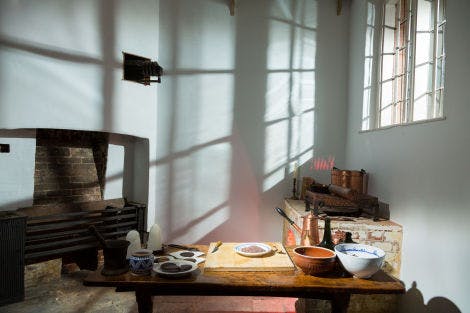
Image: The Chocolate Kitchen is the only surviving kitchen of this kind in Britain. © Historic Royal Palaces/Richard Lea-Hair
Sweet survival
The Chocolate Kitchen is the only surviving kitchen of this kind in Britain. After careful studies, the Chocolate Kitchen was opened to the public in February 2014, with a display that retells the story of chocolate made for George I by his own personal chocolate maker Thomas Tosier.
Watch The Chocolate Kitchen at Hampton Court Palace Video
The Chocolate Kitchen had been mentioned in many documents but its location remained a mystery. Then in 2013, one of our curators discovered an 18th-century inventory of the palace, pinpointing the location of this rare royal kitchen in Fountain Court.
This content is hosted on YouTube
This content may be using cookies and other technologies for which we need your consent before loading. To view the content, you need to enable cookies for "Targeting Cookies & Other Technologies".
Manage CookiesVideo transcript of The Chocolate Kitchen at Hampton Court Palace
Follow along with an interactive transcript of The Chocolate Kitchen: Hampton Court Palace on YouTube. A link to open the transcript can be found in the description.
Take a look around the Chocolate Kitchen on our 360-degree image, created in partnership with Google Arts & Culture.
Browse more history and stories
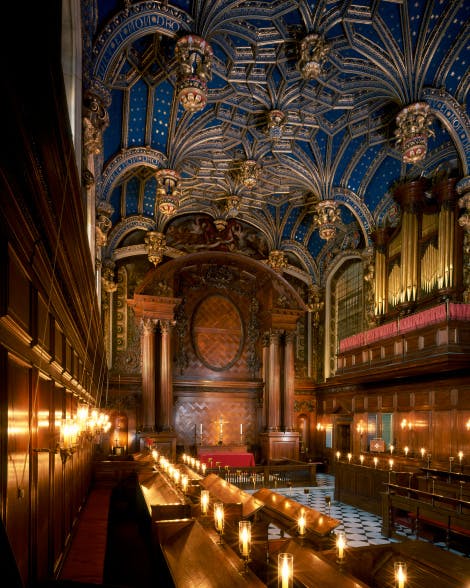
The story of Hampton Court Palace
Home of Henry VIII and the Tudor dynasty

Tudor food and eating
Royal food and table manners at the Tudor court

The Field of Cloth of Gold
Henry VIII's historic meeting with his great rival François I in 1520 was a defining point in his reign
Explore what's on

- Things to see
Cumberland Art Gallery
Discover masterpieces by Rembrandt, Caravaggio, van Dyck, and more in the Cumberland Art Gallery.
-
Open. (Subject to short notice closures.)
- Hampton Court Palace
- Included in palace admission (Members go free)

- Things to see
The Chapel Royal
Walk in the footsteps of kings and queens in the Chapel Royal.
-
Open Wednesday - Saturday
- 10:00 - 16:00
- Hampton Court Palace
- Included in palace admission (Members go free)

- Things to see
The Tudor World in the Wolsey Rooms
Discover the oldest rooms at Hampton Court Palace and meet the ordinary men and women who enabled the Tudor court to exist and flourish.
-
Open (closed on Wednesday 04 March between 11:45 and 13:00 and again between 13:45 and 15:00).
- In line with palace opening hours
- Hampton Court Palace
- Included in palace admission (Members go free)
Shop online
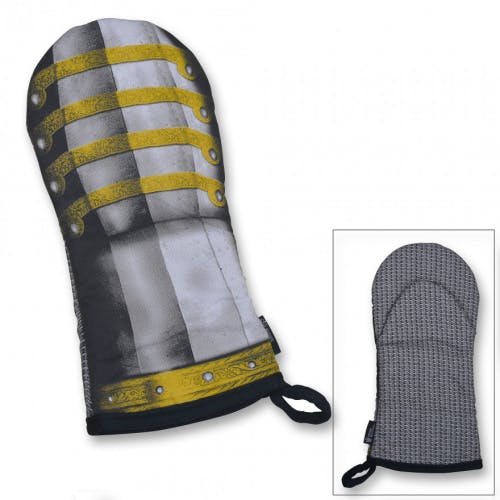
Henry VIII Gauntlet Armour Oven Glove
This fun oven glove is inspired by a suit of armour made for Henry VIII in 1540, currently on display at the Tower of London.
£18.00
